Home for the Holydays
As the end of year draws near, families and friends gather to celebrate the myriad of traditions, festivals and holy days that are observed in the hills.
The amber woods and crisp afternoons of fall have faded. Thoughts of frost, snow and ice creep like winter winds through skimpy mittens. But as the year fades, the cheerful sights and sounds of Christmas help to banish the darkness and cold. And Christmas, though it tends to take centre stage, is only one of a rich variety of spiritual celebrations that add sparkle to the season. Now begins a succession of holidays in which people, each in their own way, express gratitude for gifts past and share hopes for bounty and renewal for themselves and humankind – as greetings of goodwill ring across the hills.
Happy Hanukkah! Happy Solstice! Sat Sri Akal! Merry Christmas! Happy New Year! Peace on Earth!
Hanukkah
December 18–26, 2022
Sometimes spelled “Hannukka” or “Chanukka,” the joyous Jewish Festival of Lights falls on different dates from late November to late December every year and commemorates the rededication of a Jerusalem temple. Though not the most important holy day of the Jewish calendar, Hanukkah may be the most popular, for it is a time of celebration that is especially enjoyed by children.
To mark each sunset of the eight spanning Hanukkah, Shelburne chiropractor Richard Magder, his wife, Alexandra Georgakopoulos-Magder, and their young daughter, Rivers, recite a short prayer of thanks and light one candle of the menorah, a nine-branched candelabrum. The ninth candle is used to light each of the other eight candles.
The prayer reaffirms their faith and celebrates a centuries-old miracle, a day’s supply of temple lamp oil that lasted for eight days.
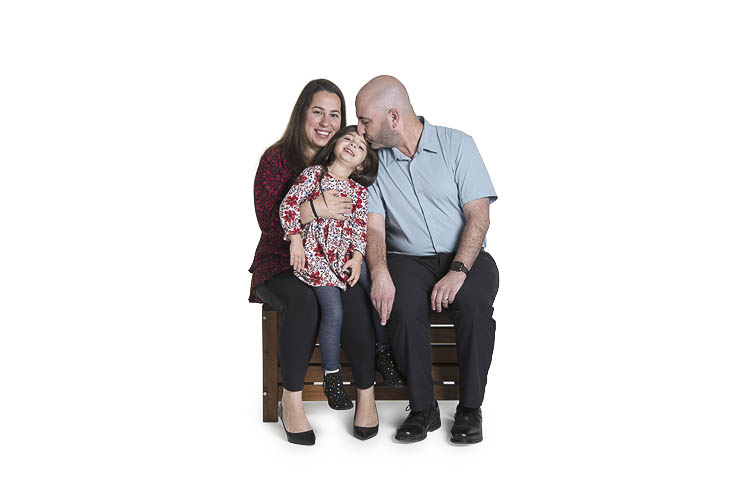
Alexandra Georgakopoulos-Magder, Richard Magder and their daughter, Rivers. Their blended-faith family practises inclusive holiday traditions. Photography by Pete Paterson.
The traditions of the holiday, handed down by his grandparents, bring warm memories to Richard. “All four of my grandparents were very big into the Jewish religion. I went to my grandmother’s place,” he says. “She always made fresh latkes (potato pancakes), cut the potatoes with us, took us through the whole process of preparing the meal. My grandfathers would teach us the prayers, the traditional values.”
Hanukkah geld (chocolate coins) was hidden throughout the home for the children to hunt for and find. Manishewitz, the traditional sweet red kosher wine, would always make an appearance.
“Being able to spend time with the family, learning the traditions, was the most engaging and fun part of the holidays for me,” adds Richard. “We’ve started to impart that to our own daughter.”
Though Richard is Jewish, Alexandra is Christian, Greek Orthodox. Their blended-faith family practises inclusive holiday traditions.
They will meet their four-year-old daughter, Rivers, by the Christmas tree each evening of Hanukkah. She will hide her eyes excitedly while Mom brings a little gift, perhaps a colouring book or a small figurine. “We do small gifts every night of Hanukkah, just for the children,” says Alexandra, who looks after the business end of Richard’s practice. “Some families do one big gift. It varies. It’s more a cultural thing.”
The family also celebrates Christmas around that decorated tree, as well as Orthodox Christmas – as observed on the Julian calendar – in early January. Santa Claus is in the mix as well.
“Because of the mixed culture, our primary focus isn’t so much the religious aspect,” Alexandra says. “More the family values that come out of the religion – togetherness, support for each other, being thankful for our blessings.”
Richard is not bothered when holidaymakers wish him “Merry Christmas!” “It’s not something I ruminate on. I’ll say, ‘Thanks, and a Happy Hanukkah to you as well.’”
But this is happening less frequently, Alexandra notes. Richard now gets Hanukkah gifts from patients. “You can definitely see it. From a general society standpoint, people are more and more embracing and respecting other people’s holidays.”
Yule
December 21, 2022
In the northern hemisphere, the winter solstice, which usually occurs on either December 21 or 22, marks the shortest day and longest night of the year. The solstice is also the day witches celebrate Yule, an ancient festival associated with other Pagan traditions that focus on reverence for nature. The English word witch morphed from the Old English word Þiċċa (pronounced wittsha), and witchcraft refers to the practice of magic, or energy manipulation. Witches connect to the physical and spiritual world to create change through divination, spell work and spirit work.
“I’ve never had any other religion. I think I was a witch all my life, I just didn’t realize it,” says Meghan Wellsbury, co-owner with her sister, Alyssa Elstone, of Healing Moon in Orangeville. In fact, says Meghan, she views witchcraft as a lifestyle rather than a religion, and she emphasizes that witchcraft practices are as varied as the individuals who identify as witches.
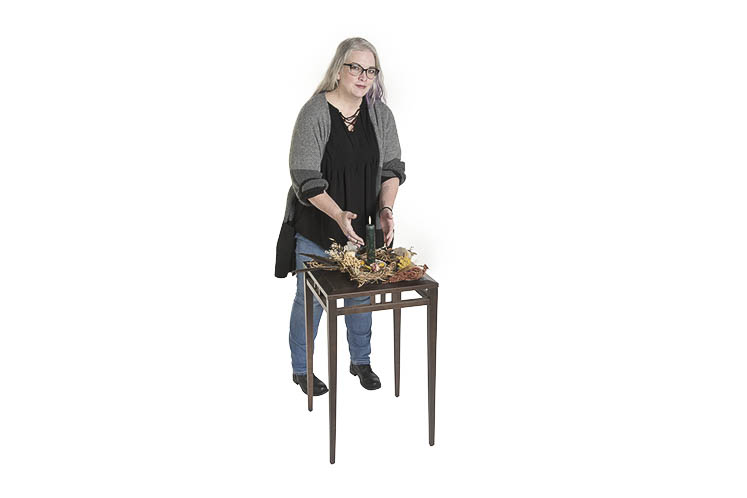
Meghan Wellsbury celebrates winter solstice with cut boughs and candles to invoke the natural energy of the elements.
But all witches have at least one thing in common. They celebrate Yule, the day of the winter solstice, because it marks the return of the light and signifies rebirth.
“Some do full celebrations, food, dancing, bonfires,” says Meghan. “Some go far out, and some do it much more quietly. It depends on the witch. We’re all so different. Because my family (her husband and son) are not part of it, I go very low key.”
So no dancing by a midnight bonfire under a frigid winter moon? “Oh, no! Indoors. I’m not a winter person. I’d rather do bonfires in the summer!
“People were hunters and farmers. Winter was stark. Even now, we get tired of it being so dark. A Yule log was burned as a symbol of the sun. I don’t do a Yule log. I like evergreens as a symbol of love through the hard times. I’ll have boughs in every room.
“A lot of witches will create a solstice altar, a space in their home to put very specific things to celebrate. I don’t do one every year. It depends on the year. On mine, I’d have evergreen, holly, certain stones. Some work with a deity, some work with Gaia, the goddess. I work with the elements: fire, water, earth, air, spirit and the universal energies to create magic. Positive magic.
“I work with candle magic. I’ll set my intention – what I want the New Year to bring – write it into the candle, sit and meditate on it. My intention for 2022 was to have a calming existence, to quiet the crazy that has happened the last couple of years.
“I use essential oils, herbs, crystals and candle magic. The oils you pick, the herbs and crystals all relate to the spell you are working on.”
But is this witchcraft more than simply good intentions?
“It is a physical process, as well as an intention, and the fact that you are moving energy to make it happen. You are working with the energies. I am doing something. I am present in the moment, creating the magic that I need. I’m carving into candles. I’m focused. I’m not just making a wish and hoping something happens.
“There is magic behind it.”
Christmas, Jamaican style
December 25, 2022
Though most Christians celebrate Christmas, or Christ’s mass, on December 25, the Bible makes no mention of the birthdate of Jesus Christ, which leaves his actual date of birth open to debate. Some speculate the Catholic Church chose December 25 to co-opt Pagan winter solstice festivals that fell around that time. The first celebration of Christmas – called “Yule” at the time – is thought to have occurred in 336 CE, but the festival didn’t become a widespread Christian celebration until the 9th century.
Jamaica doesn’t get snow, most homes are without chimneys, and traditional Christmas carols are often sung with a reggae lilt, but Father Christmas does visit the Caribbean island.
“The Santa I knew as a girl in rural Jamaica wasn’t the typical jolly old fellow that many Canadians are used to,” laughs Mono resident Polvier Folkes-Grandison. “Our Santa was usually a grandpa from our local church or the community who volunteered to bring the village children some Christmas cheer wearing a homemade red Santa suit stuffed with a pillow.”
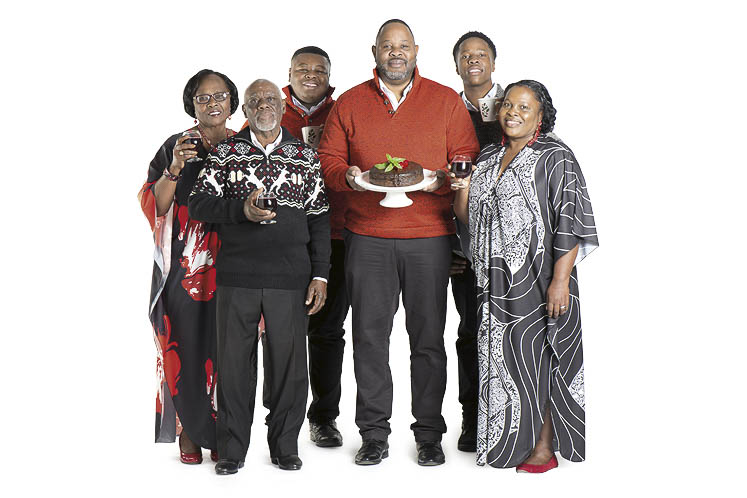
From left: Evadney and Robert Folkes, Graden Grandison, Gregory Grandison, Spencer Grandison and Polvier Folkes-Grandison. The family’s Christmas feast includes a traditional sorrel beverage, hot chocolate, and rum-soaked black cake.
In the rural Jamaican town of Alexandria, in the mountains of the parish of St. Ann, modest homes weren’t lit up for Christmas, but they would be repaired, tidied inside and out and maybe freshly painted in bright colours.
Though conifers are not unknown on the island, “chopping down trees to decorate would be confusing to people,” says Polvier, who works with World Vision Canada. “You cut down a tree for cooking (firewood) or to make furniture.”
A single string of lights was often suspended on the veranda. Stockings were hung at the foot of beds. Gifts were mostly practical: new shoes, a purse, or a new outfit to wear to church.
“Christmas was all about family. All about food,” she adds. “You’d buy a pig. Someone would come in and butcher it, cure and prepare the ham, boiling it in brine, from scratch. Share the meat. It would be a big community event. There would be beef, pork, chicken, goat, fish, oxtail, black (fruit) cake and sorrel (a drink made from hibiscus flowers and often spiced with rum).”
Christmas centred on church, school and, on Christmas Eve, the Grand Market and lively Junkanoo street parade, a pan-Caribbean celebration of the emancipation of enslaved Africans, featuring music, dancing and costumed revellers.
“Grand Market night was a time kids would look forward to,” says Polvier. “It was a time of excitement and joy, access to sweets, being with friends, rushing down to the main street to see the parade, the biggest shopping event of the year. You’d have enough allowance to buy gifts: stocking fillers, novelties, little toys like pinwheels or board games, things you could share with your friends. Not like now – ‘I want a PlayStation 5 for Christmas!’”
In Canada for 22 years, Polvier and her husband, Gregory, along with their two teenage sons who were born here, decorate a Christmas tree together, adding gifts throughout December. But in a tradition brought from home, they serve a huge buffet-style meal on Christmas Day. “A whole array of meats, a large collection of options,” says Polvier. And their post-Covid home will be opened once again to extended family and perhaps someone who lives alone.
“Christmas is a time to share,” she says.
Martyrdom of the Sahibzadas
December 26, 2022
The Sikh faith is based in the state of Punjab in northern India and focused on the Golden Temple of Amritsar. Sikhs follow the philosophies of a line of long-departed gurus, or teachers. Among Sikhs, however, the title “guru” is an honour accorded only to the 10 gurus who founded the religion. Many Sikh festivals and holidays celebrate the lives and strife of these gurus.
Hungry or just curious, all are welcome in the gurdwara.
The community kitchen at any gurdwara, or Sikh temple, offers simple vegetarian meals to anyone, of any faith, free of charge. It is an ancient charitable tradition.
Should you find yourself in the gurdwara around the Sikh celebration of the Martyrdom of the Sahibzadas, don’t be puzzled by the smiling faces, happy families, upbeat songs and music.
Many Sikh festivals celebrate the birth, famous battles fought by, and sometimes brutal deaths of the line of gurus, and their families, whose teachings Sikhs follow. The word Sikh itself means “learner” or “seeker.”
The martyred Sahibzadas, or young princes, were four sons of the final in the line of gurus. Rather than renounce their faith, the two youngest chose to be bricked alive in a wall by their persecutors.
“We don’t celebrate the martyrdom. It is hurtful, but we are remembering and honouring as well. It is the feeling of sacrifice that I revere. It touches my heart,” says Shelburne resident Amanjeet Grewal, the mother of a teenager and two younger children.
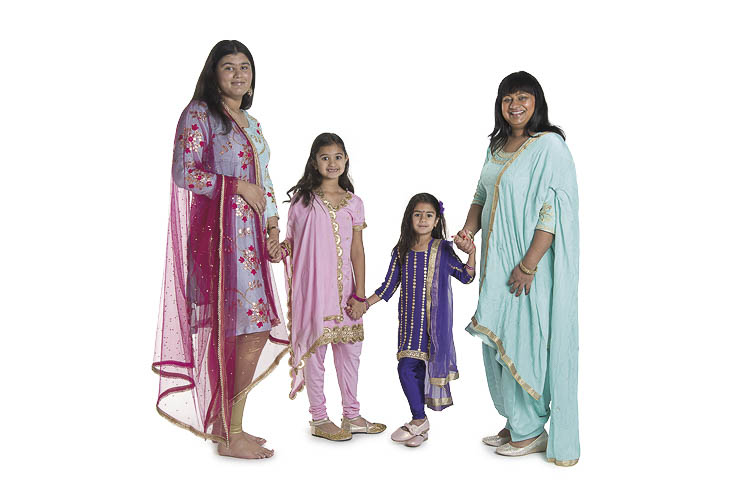
From left: Sisters Alisha Grewal, Bubleen Bahga and Jasmine Bahga with their mother Amanjeet Grewal, dressed in their temple-going finery.
The celebration stretches over five days at home and in the temple. At home, the family lights small oil clay lamps, or diyas, for the duration of the celebration.
At gurdwaras in Orangeville and Mono, “You’ll be greeted, hands together in welcome,” says Amanjeet. “You smell the fragrance of food, curry, rose-scented incense. We sit cross-legged on the carpeted floor, men and women in traditional clothes, sitting separately. There will be sweets, snacks, decorations. There is music, singing, hymns and drumming. It is a fun ceremony. It brings inner peace.
“I don’t go all day, every day. I drop in and out. I take the kids during the day. My husband, Vanderjit Bahga, works. Because of Covid, in the past two years, I’d limited it. We go in the evenings, five days, as a family. There are no gifts given.”
But there are gifts at the family home for Christmas, coloured lights on their house, inflatables in the yard and a big Christmas meal on the table.
“To me all faiths are the same,” Amanjeet adds. “I’m teaching my kids to grow. There is a tradition of Santa for the kids. We’re in Canada. I have my door open for my kids and my family. We learn about each and every culture.”
Nichiren Buddhist New Year
January 1, 2023
Buddhism has many branches, each with its own cultural traditions, focus and New Year’s Day. But for all Buddhists, the transition from the old year to the new is a time of reflection, renewal and self-improvement.
Steve Ray laughs when asked whether any of the devotees who usually gather from across southern Ontario at the SGI Canada Culture Centre in Toronto on New Year’s Day arrive hungover. “We don’t have any regulations on that. We’re all about the middle way,” he says, still laughing. “No extremes about most things.”
A Caledon resident and the operations manager for the Toronto Symphony Orchestra, Steve has practised Nichiren Buddhism, established in Japan the 13th century, since 2013. “Buddhism is a religion, but I don’t think of myself as a ‘born-again’ Buddhist. It is a philosophy for daily life.”
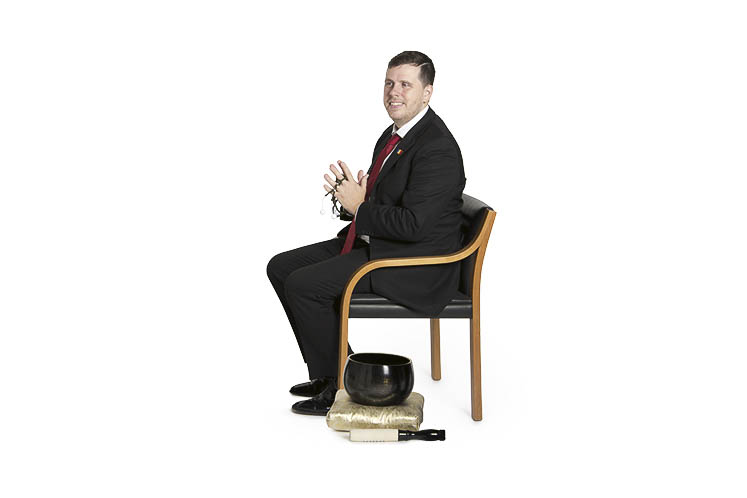
Steve Ray with his prayer beads and a chiming bowl. Both are aids to meditative relaxation.
In Headwaters, Buddhists usually get together in one another’s homes, though the pandemic has meant these meetings have become virtual. On New Year’s Day in non-pandemic times, they would assemble with others from across southern Ontario for special ceremonies at the SGI Centre. SGI – Soka Gakkai International – is a support network for Nichiren Buddhists, who are dedicated to the principles of Buddhist humanism. But out of an abundance of caution and concern for the health of all, this coming New Year’s Day, the ceremonies will again be virtual.
No matter what the venue, though, says Steve, “People are excited. They have a big smile, or if they don’t, you are the person who encourages that. Everyone is making a great start to a new year together. Great positive vibes.”
During the 90-minute ceremonies, Nichiren Buddhists chant for 10 to 15 minutes with a leader’s guidance. They intone, “Nam-myoho-renge-kyo,” a repetitive mantra intended to awaken dormant wisdom, their enlightened Buddha self.
Devotees face the gohonzon, a scroll written in Japanese and Sanskrit characters and resting inside a wooden altar. Much bigger than altars found in private homes, the centre’s altar would be adorned with candles, a basket of fruit and a bell, rung to punctuate chants and event speakers.
While chanting, devotees may be thinking about their “determination.” But, says Steve, the idea is to “let the mind go where it needs to go.”
The determination of the youth division, which Steve leads, is “engagement,” to help the isolated. “People are Zoom-fatigued, not just for our meetings, for work and socially,” he says. “It has become a challenge to connect. Our determination was to have more dialogue. To re-establish contact with as many people as safely as possible.”
Steve’s personal determination for 2022 was to buy a house, something he achieved this past summer when he bought a house near Snelgrove.
How does a Buddhist’s “determination” differ from a prosaic New Year’s resolution? “Maybe it is in the way you follow through,” he says. “I want to chant to overcome and achieve in my life.
“We chant for ourselves and for others. We all do different things, come from different walks of life, different cultures, have different goals, but we are all striving for one thing: to be happy. How are we going to actualize that?
“That is what brings us together. It is quite moving. Two hundred people chanting are a force.”
Related Stories
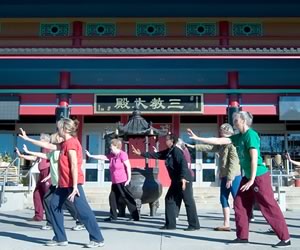
A Path to Stillness, Clarity and Wisdom
Nov 19, 2013 | | Back IssuesThe International Tai Chi Centre in Mono draws people from around the world to practise the ancient art.
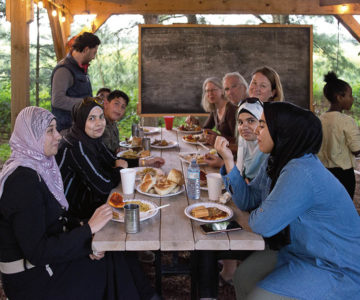
Feeding the Soul
Sep 20, 2022 | | CommunityCommunal gardening helps newcomers nourish the sense of community lost when they were forced to flee their homeland.










